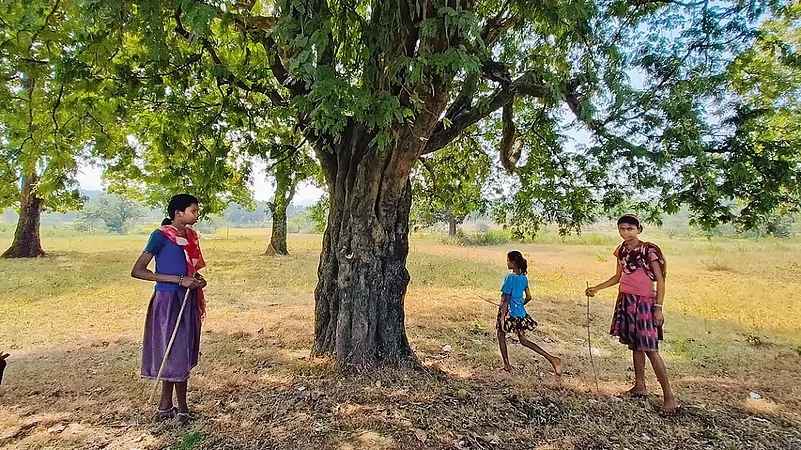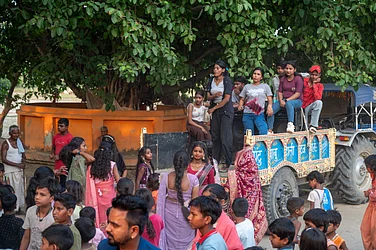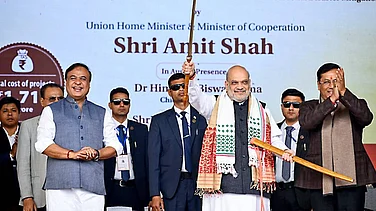Between a Rock and a Hard Place
“Jo bhi kasme khai thi humne. Vaada kiya the jo milke. Tu ne hi jeevan mein laaya tha mere savera…Kya tumhein yaad hai?”
The piercing voice of 90s playback queen Alka Yagnik rang through the night as a white Swift Dzire car hurtled along the narrow, unlit road connecting Narayanpur to Dantewada in Bastar. It was a song I remembered well from my childhood though I wouldn’t care to admit it in public now. Lost in the forests where they say Lord Ram was in exile and now the Maoists are, the song rang out like a prophecy. Here in Bastar, no one forgets promises—the ones they make or the ones made to them.
I recalled the words of a man I had spoken to a day ago in Bijapur—a tribal who grew up in the height of the Maoist-Salwa Judum violence (and, incidentally, acted in the Bollywood film Newton)! He said, “Maoist ne aazadi ka vaada kiya. Sarkar ne vikas ka vaada kiya. Dono apne vaade bhool gaye’’ (The Maoists promised us liberation. The government promised us development. Both forgot their promises).
Some Dreaded Words
I recently spent four nights in a small transit town named Geedam in the Dantewada district of South Bastar. Nearby is a bridge that takes one across the river Indravati to the hills of Abujhmarh where the Maoists continue to wage a war against the Indian government and run their own ‘people’s government’—the Janatana Sarkar. They claim that they fight for the rights of the forest and those who live in it: the Adivasis, the true owners of the land.
Adivasis say that the Maoists fight for their ideology, not for the people. Many Adivasis are killed by Maoists who suspect them of being a mukhbir (informant), a dreaded word in these parts. In Bijapur, I met a woman who lost her brother that way. A painted memory pillar stands erect outside his rural home. Another memory pillar told the story of a teacher, killed in an “encounter” by the “force”. Some other dreaded words in these parts.
The Maoists make no bones about their hatred for politicians, the Indian government, and anything associated with it. In these hills, a white car during election time (when I was visiting) can very easily be mistaken for a sarkari vehicle. That night when we got lost in the forests of Abujhmadh in our Swift Dzire, we joked about our car being accidentally blown up. As we passed a makeshift road blockade crafted by Maoists, I wondered if there were improvised explosive devices (IEDs)planted under the stones they had used as paperweights to pin their parchas containing messages of poll boycott and warnings against crooked politicians. I thought about the 2018 elections in Bastar when a journalist was blown to bits along with two security personnel. He too had gone there, like me, to cover elections in Bastar.
The Land of Memory Pillars
My friend, the intrepid local scribe who was my guide in Bastar, tried to assure me. “They don’t hurt journalists. Not on purpose, anyway. But they may take one hostage.” I could see the embarrassing headlines flash on TV screens: “Female Reporter Abducted by Naxals Amid Elections in Bastar”. The horror!
After driving around in the dark and being completely directionless for about 20 minutes, we saw some approaching flashlights. We froze. Was that ‘‘them’’, the dada log?
They turned out to be villagers, out to hunt for animals. (I recalled how the Salwa Judum ‘‘hunted for Maoists’’. I pushed the thought away). They looked worried when they saw us but helped us with directions. It took us about 20 more minutes to figure our way out of the forest and even then, we had about 60 km of unlit road in that Naxal-dominated belt to cover before we crossed the Indravati, back to town.
The driver, a Bilaspur resident who had thought Naxals were a thing of the past until that night, played the Raaz OST album on repeat on the stereo. I wondered if blasting music was the wisest choice—wouldn’t it be better to be as discreet as possible while we crossed these roads? What would the Maoists think? Do they like Bollywood music? Would it matter?
The music, however, seemed to calm the driver, who drove at an unhinged, breakneck speed. He hummed along sometimes and I joined in. In Bastar, the land of memory pillars.
“Kya tumhein yaad hai? Haan mujhe yaad hai…”
Rakhi Bose is Assistant Editor, Outlook


























